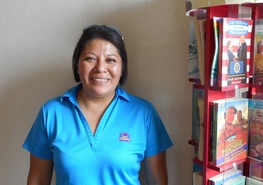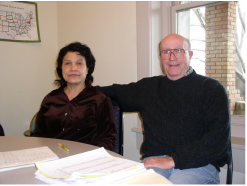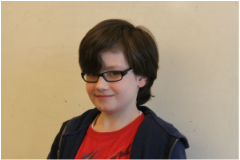Why We Do What We Do
Hi John,
I ran into your old student at the Post office last week.He filled me in on what caused his absence last year. Turns out his teenage son was in an accident in June on the Sellars bridge. Apparently it was very serious, his son was air lifted to Harborview and was touch-n-go for quite a while. Your student pretty much stayed in Seattle for almost 3 months while the son went through numerous surgeries. All the injuries were to one side of the body he describes injuries to arm, shoulder leg as mangled and had to be reconstructed.
He described to me that amidst all the chaos and tragedy they were going through he realized how much he was able to understand. He said of course, he could not put together responses BUT, he totally appreciates that had he not had all that instruction with you he would have been totally in the dark.
All the more reason he wants to return to classes. It was touching to me that he asked "do you think John would consider taking me back?"
I assured him of course that he is more than welcome and we encourage him to come back to continue his learning.
He literally just returned to Wenatchee, is back at work,wanting to return to classes.
He will be calling when Stemilt makes the change to his work schedule, when they do it will again fit perfectly with your class, which he is anxious to return to :) He asked about your other students too.
Talk to you soon :)
I ran into your old student at the Post office last week.He filled me in on what caused his absence last year. Turns out his teenage son was in an accident in June on the Sellars bridge. Apparently it was very serious, his son was air lifted to Harborview and was touch-n-go for quite a while. Your student pretty much stayed in Seattle for almost 3 months while the son went through numerous surgeries. All the injuries were to one side of the body he describes injuries to arm, shoulder leg as mangled and had to be reconstructed.
He described to me that amidst all the chaos and tragedy they were going through he realized how much he was able to understand. He said of course, he could not put together responses BUT, he totally appreciates that had he not had all that instruction with you he would have been totally in the dark.
All the more reason he wants to return to classes. It was touching to me that he asked "do you think John would consider taking me back?"
I assured him of course that he is more than welcome and we encourage him to come back to continue his learning.
He literally just returned to Wenatchee, is back at work,wanting to return to classes.
He will be calling when Stemilt makes the change to his work schedule, when they do it will again fit perfectly with your class, which he is anxious to return to :) He asked about your other students too.
Talk to you soon :)
|
|
Jose was nice enough and brave enough to consent to doing an interview with us so that you could hear a student's story. You might ask why it was mostly in Spanish. Even though Jose is making great progress, he is still a little shy about speaking English on a video. I know native English speakers that feel the same way.
|
JOSE TELLS HIS STORY. |
Success Stories
It is so encouraging to receive a comment from a student
like the one I received today. I told my student, Lety, that I was not sure she
would get credit from her employer for our summer hours since we were only
meeting one day a week for the months of July and August. "Oh, that does
not matter," she assured me. She proudly pointed to her notes and
paperwork and said, "This is much more important than the credit to
me!" I could have hugged her I was so pleased.
Susan
Susan
 Jesucita Martinez
Jesucita Martinez
Last Tuesday, Martha Rodriguez visited with Jesucita Martinez
about her experience in learning English. Jesucita came to the United States 20
years ago. She registered at the Literacy Council in June of 2013. Because we
have seen so much progress in her English and in her self-confidence, we wanted
to hear about her journey to get to this point. These answers are as spoken.
Martha asked her, “How did you hear about the Literacy Council?”
“I was taking classes at United Methodist Church and their classes were ending and they suggested we come here”
How learning/improving your English helped her in her day to day life?
“I can accomplish what I need or want without depending on someone” How has it helped at your workplace?
“I am able to understand my Supervisor or Manager, what he tells me. I still have a lot to learn.”
What difference does it make to have a small class and a tutor who knows you and your needs?
“With a tutor you have a chance to ask questions and get answers. In large classes you can’t ask or you get scared. You can’t get what you need because there are too many students and teacher does not have time to know you or know what you need”
When do you practice English?
“At work, with my kids, but not much”
Are Anglos helpful when you try to say something in English?
“They ignore you if they don’t understand; if others laugh you won’t want to talk to them again. I get help from people that know about learning another language. My boss at work is Chinese; he helps me when he can”
What are your best experiences from classes with the Literacy Council?
“From my first tutor Mary White I learned to not be scared. Before I was with Mary I would not make eye contact; if I spoke I would not look at the person. She helped me a lot with pronunciation. She had me read to her a lot and correct my pronunciation and to repeat.”
“From my second tutor, Gloria Reichmann, I learned more English, more pronunciation, how to form questions. Most important she teaches me about goals. How to make goals, how to succeed. I never had this in other places. I carry my list of goals with me and always remember Gloria tells me, “You can do this.”
Martha asked her, “How did you hear about the Literacy Council?”
“I was taking classes at United Methodist Church and their classes were ending and they suggested we come here”
How learning/improving your English helped her in her day to day life?
“I can accomplish what I need or want without depending on someone” How has it helped at your workplace?
“I am able to understand my Supervisor or Manager, what he tells me. I still have a lot to learn.”
What difference does it make to have a small class and a tutor who knows you and your needs?
“With a tutor you have a chance to ask questions and get answers. In large classes you can’t ask or you get scared. You can’t get what you need because there are too many students and teacher does not have time to know you or know what you need”
When do you practice English?
“At work, with my kids, but not much”
Are Anglos helpful when you try to say something in English?
“They ignore you if they don’t understand; if others laugh you won’t want to talk to them again. I get help from people that know about learning another language. My boss at work is Chinese; he helps me when he can”
What are your best experiences from classes with the Literacy Council?
“From my first tutor Mary White I learned to not be scared. Before I was with Mary I would not make eye contact; if I spoke I would not look at the person. She helped me a lot with pronunciation. She had me read to her a lot and correct my pronunciation and to repeat.”
“From my second tutor, Gloria Reichmann, I learned more English, more pronunciation, how to form questions. Most important she teaches me about goals. How to make goals, how to succeed. I never had this in other places. I carry my list of goals with me and always remember Gloria tells me, “You can do this.”
 Maria and her tutor, Darold Wax
Maria and her tutor, Darold Wax
Veronica - By Esteban Santana
Veronica came into the office to get help learning English. Her determination and commitment to
self-improvement made a real impression on me. I taught her how to use the Rosetta Stone program and kept in contact with her until my AmeriCorps partner, Alysha MacPhee, and I were finally able to find a tutor for her.
After her second class with the tutor, she came in to see me, excited to share that she had learned the alphabet!
Veronica was so happy and thrilled by what she had accomplished. Many may not consider this a milestone but the look on her face would convince even the most skeptical. This made me feel like I had accomplished something also.
The fact that I had brought so much joy into someone’s life by doing something many don't find to be "so hard," almost brought me to tears. I hope to find more situations like this one, because it’s good to cry every once in a while for the right reason.
Maria - By Louise Verellen
During the four years she has studied English as a Second Language (ESL) with her tutor at the Literacy Council, Maria gained more than vocabulary and grammar skills. Volunteer tutor Darold Wax reports that, recently, Maria received a bill from her doctor’s office. She knew it was an expense her insurance company should cover so she did something that is very difficult, uncomfortable, and somewhat scary for a second language learner: She picked up the phone and called her doctor’s office. As best she could, in English, she explained who she was, the nature of her concerns, AND how her insurance benefits work!
In the ESL world, confidence comes with assiduous work, encouragement, persistence, and practice. It is the door to attainment. Through the years, as Maria’s confidence grew, she has used English more and more often. She has successfully improved her language skills the only way it can happen…by speaking!
Maria was very proud and happy to share with Darold that her insurance did cover her doctor’s visit, and paid up!
Isidro and Nilda
Isidro and Nilda are Stemilt employees who attend classes at their work site with volunteer tutor Karen Madison. After 45 hours of instruction, their post-test revealed they had moved more than a whole English as a Second Language (ESL) level up!
Flor
Flor Z. is a single parent of two school-aged children. For the past several years she worked night shifts, juggling work and parenting as best she could. During that time she also faithfully attended class, in the morning, with her tutor John Moffat.
Recently she reported to him that she needed to quit her class because she had gotten a new job. Since her English skills have improved so much, she finally was promoted to a Quality-Control position which takes place during the daytime
Reader Extraordinaire Elijah White.
 Elijah White
Elijah White
A Thanksgiving holiday spent reading helped pay for the training of 14 new tutors in February for the Literacy Council of Chelan and Douglas Counties.
To meet rising demand for literacy and English as a Second Language education in Wenatchee, staff members held an all-day tutor training session Feb. 8.
The workshop was funded in part by veteran fundraiser Elijah White whose Thanksgiving Holiday Read-A-Thon raised $2,013. This was his fourth year of bringing in donations for the Literacy Council by reading relentlessly over the holiday.
Elijah, 10, once again exceeded his target. The response from family and friends as well as the Wenatchee Valley community, especially Confluence Health, gave a lift for the Literacy Council which, since September, is managing 49 tutors teaching 224 students with more than 48 prospective students currently on the waiting list.
At the weekend workshop, led by Literacy Council Director Louise Verellen, Volunteer Coordinator Kay Loeffler and Student Coordinator Martha Rodriguez, prospective tutors learned about strategies and resources to help scores of local residents learn English and attain basic literacy. The aim is to give adult students the skills necessary to further themselves in their jobs and education.
This was Elijah’s fourth self-organized Read-A-Thon. The quiet fourth grader from Columbia Elementary School is the son of Rebekah and James White of Wenatchee.
His reading interests extend from young adult fiction to nonfiction books on archaeology. He also likes writing his own comic books and making videos. Plus, he loves playing soccer, says his mother.
To meet rising demand for literacy and English as a Second Language education in Wenatchee, staff members held an all-day tutor training session Feb. 8.
The workshop was funded in part by veteran fundraiser Elijah White whose Thanksgiving Holiday Read-A-Thon raised $2,013. This was his fourth year of bringing in donations for the Literacy Council by reading relentlessly over the holiday.
Elijah, 10, once again exceeded his target. The response from family and friends as well as the Wenatchee Valley community, especially Confluence Health, gave a lift for the Literacy Council which, since September, is managing 49 tutors teaching 224 students with more than 48 prospective students currently on the waiting list.
At the weekend workshop, led by Literacy Council Director Louise Verellen, Volunteer Coordinator Kay Loeffler and Student Coordinator Martha Rodriguez, prospective tutors learned about strategies and resources to help scores of local residents learn English and attain basic literacy. The aim is to give adult students the skills necessary to further themselves in their jobs and education.
This was Elijah’s fourth self-organized Read-A-Thon. The quiet fourth grader from Columbia Elementary School is the son of Rebekah and James White of Wenatchee.
His reading interests extend from young adult fiction to nonfiction books on archaeology. He also likes writing his own comic books and making videos. Plus, he loves playing soccer, says his mother.
February 2013 (Martha Rodriguez, AmeriCorps member serving at the
Literacy Council as student coordinator)
Midday during snow a mother and her 7 year old child walked in. She wanted information on ESL
classes. As I was registering her and explaining our program and what we had to
offer, I noticed an exchange of looks and grins from son to mother. Turns out,
little Pedro was the motivator to get mom in here to find out about
classes.
She related to me she had just picked him up from school
and as they were walking by Pedro said "come on mami, let’s go in there now and
ask about the classes, you need to learn because now I am learning in school to
speak English and so should you" (translation).
We got her
registered; afterward she came in for testing and was placed with a tutor. Not
even two weeks later, Pedro Sr. came in for registration. He followed up and
came in for testing and is now attending classes with a tutor. I will add that
when possible he attends a conversation class.
Also,
they both are registered and signed on to our Rosetta Stone program.
I have been here since September as an AmeriCorps volunteer
and not a day goes by that I do not run across a good "real-life' story.
This is, by far, the greatest one.
Literacy Council as student coordinator)
Midday during snow a mother and her 7 year old child walked in. She wanted information on ESL
classes. As I was registering her and explaining our program and what we had to
offer, I noticed an exchange of looks and grins from son to mother. Turns out,
little Pedro was the motivator to get mom in here to find out about
classes.
She related to me she had just picked him up from school
and as they were walking by Pedro said "come on mami, let’s go in there now and
ask about the classes, you need to learn because now I am learning in school to
speak English and so should you" (translation).
We got her
registered; afterward she came in for testing and was placed with a tutor. Not
even two weeks later, Pedro Sr. came in for registration. He followed up and
came in for testing and is now attending classes with a tutor. I will add that
when possible he attends a conversation class.
Also,
they both are registered and signed on to our Rosetta Stone program.
I have been here since September as an AmeriCorps volunteer
and not a day goes by that I do not run across a good "real-life' story.
This is, by far, the greatest one.
2. December 22, 2011 (Louise Verellen, Program Director)
Ricardo L. immigrated to the U.S. ten years ago in search of a better life. He worked as a waiter in Mexico City where he had a hard time making ends meet although he liked what he did for a living. When Ricardo moved to Wenatchee, he applied for a wait person position at the Red Lion Hotel where he was told that because of his low English speaking skills he could only work as a dishwasher. He was also told that if/when his English skills improved, he would be considered for a wait person position.
Ricardo registered as a student at the Literacy Council right away and took advantage of tutoring instruction and conversation classes, making his way to the Literacy Council sometimes four times a week.
Last year, he was offered and accepted a waiter position at the Red Lion in their banquet facility where he is recognized as a great waiter and as a great employee. Ricardo’s ambition was to return to a job he likes and at which he excels. The only thing standing in his way was language. Through hard work and perseverance, and a little help from volunteers at the Literacy Council, he succeeded in making it a reality. He still attends his classes regularly. When we talked to the Red Lion management, we were told that Ricardo not only gets the highest-rated employee evaluations from supervisors and impeccable reviews from co-workers, he gets them consistently.
June 2011 (Melissa Stephenson, Tutor)
Gerardo says he probably wouldn’t have graduated, even if he had stayed. He didn’t learn very much in his crowded East Los Angeles schools, and no one seemed to notice. “If you failed, you passed. They wanted you to move along.”
With three months left in his senior year of high school, Gerardo relocated with his parents as they sold their house. Through these circumstances, he became a high school drop-out.
For the next 17 years, Gerardo worked. First, he worked at a food processing plant, helping to support his parents; later, he did electrical and fiber optics work, supporting his own family. Although Gerardo did well for himself through these jobs, he says that not having a high school education “was eating me up inside.” Returning to school someday was always in the back of his mind.
Twice, Gerardo attempted to take classes at the community college to prepare for the 5-subject GED (General Educational Development) high school equivalency test, but found that he was missing too many classes while working a full-time job that required him to be out of town
frequently. High school was even more difficult as a working adult.
When Gerardo was laid off from work last summer, he knew that it was his opportunity to go back to school. He wasted no time registering for classes at Wenatchee Valley College, through the Adult Basic Education department— a program designed to prepare adult students for the
GED test. While in this program, Gerardo also took advantage of mentors and tutors through both the college and the Literacy Council.
Seven months later, Gerardo received the results in the mail: he had passed the tests and earned his GED.
“It was something I thought I would never accomplish,” Gerardo remembers. Preparing for the GED was challenging: years of education were condensed into months; being a student meant no income, which was financially difficult; and it was strange to be in school again, after so many years in the workforce. Gerardo endured long nights of math homework, and months of a tutor critiquing his 5-paragraph essays, sending him back to write more and more.
Yet when the test results arrived, his most feared subjects — writing and math — were his highest scores.
Achieving his GED has raised his self esteem, Gerardo says. Those around him agree: “Yes, Gerardo has changed a lot. He knows now that he can do things when he applies himself. "I am thankful to have been part of this transformation,” says Dan, Gerardo’s math tutor at the Literacy Council.
Gerardo also has a new ambition for education. “Knowing that I was able to do that… now I want to go beyond that and get a degree— not stop there.” Gerardo is registered for credited classes this fall at Wenatchee Valley College, where he will pursue an Associate’s Degree. Congratulations, Gerardo, on your hard work and accomplishments!
1. September 2009 (Leanne Stewart,
Tutor)
Imagine leaving your home for the chance at a
better life. Now imagine not knowing the language of your new country
where your education and employment background is not recognized; and finding
yourself trapped in poverty culture because of the language barrier. What would
you do?
The Literacy Council of Chelan and Douglas Counties is
only too aware of problems like this and has, through the years, developed an
English as a Second Language (ESL) program to help solve them. Three decades
after its inception, the Literacy Council is still meeting growing needs in our
community.
C. was a professional in the
mental health field in Peru, her home country. With the equivalent of a US
masters degree in psychology and years of professional experience behind her,
she came to the United States to build a better life. Imagine her shock
when she discovered that her lack of fluency in English could only land her a
cherry picking job in the local fruit orchards. It was grueling work for someone
accustomed to helping patients in a hospital setting. “I don’t think there is
anything wrong with working in the fields but that was not what I was trained
for,” C. shared.
Looking for and learning about new opportunities,
C. was determined to improve her speaking and writing skills by enrolling in
courses at Wenatchee Valley College, the local community college. There,
she was referred to the Literacy Council where, for the moment, she is focusing
on ESL. What she didn’t know was that the Literacy Council is more than just ESL
instruction. With the help of her tutor, C. is currently developing a plan that
will open her up to employment in the mental health field while she awaits her
university transcripts from Peru to be accepted in the US.
Two years
after coming to the United States, C. is finally beginning to reach for the new
and better future she had envisioned. Through the work performed in adult
literacy, the Literacy Council is positively in the business
of changing lives.
